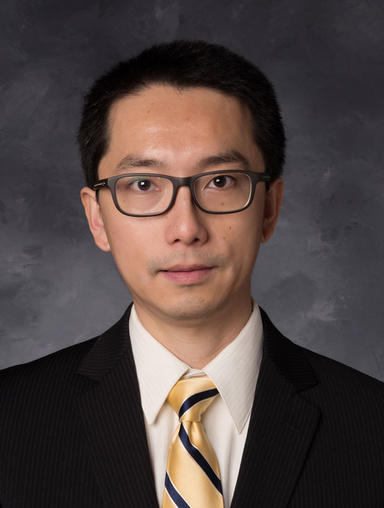The Graduate College’s Business Analytics master’s program, housed within the Tippie College of Business, may be relatively new, but it has already established an impressive track record. The program has seen its rankings and enrollment steadily increase since its inception in 2014, with more than 150 students currently enrolled and an extremely competitive admissions process.

Nick Street, former business analytics department chair and Associate Dean for Research and PhD Programs in the Tippie College of Business, credits the foundation of the program as part of its rapid success. When he began designing programs for the new discipline, he looked to the college’s long track record of specializing in data science as a starting point. His goal was to create a niche specialty with faculty who excelled in the field. He was also keen to connect with communities beyond Iowa City by establishing the new part time master’s program at multiple sites across the state.
“Designing the master’s program to be off-campus was part of our goal to be better engaged with the state,” says Street. “Especially considering the business community in Des Moines, data analytics is a skill that companies want in their employees, and it’s easier for them to train a current employee than to hire a new one. We knew that if we showed up at their doorstep offering to teach these courses, they would love it.”
Initially introduced in Des Moines, Cedar Rapids, and the Quad Cities, interest in the program quickly exceeded capacity.
“Our part-time program in Des Moines overran the building,” says Street. “We had to create second offerings of all the courses, because even though we were getting more selective, we realized we were still leaving too many good students on the table. We ended up remodeling part of the building to increase our capacity in Des Moines.”
ENGAGING STUDENTS WHILE DEVELOPING SKILLS
Faculty in the business analytics program teach students a framework of descriptive, predictive, and prescriptive analytics. This involves examining existing data, forecasting what will happen, and identifying what responses are appropriate based on what is expected to occur. Beyond the core curriculum, faculty also lean in to teaching their students the ‘soft skills’ they need to succeed.

“We are in a unique position to combine hard, technical skills in analytics with soft skills in business,” says Kang Zhao, director of the business analytics full-time graduate program. “Not only do we want our students to have excellent data analysis skills, we also want them to be able to clearly communicate their findings and ideas to colleagues and executives, so they can make a significant impact within their company.”
Students use these new skills in a capstone project during their final semester in the program. The projects ask students to solving a ‘real-world’ business problem via a group project or competition. For example, the Iowa City program brings business analytics graduate students from across the country to tackle a current topic in the business industry. This year, the program is excited to share that the Bill & Melinda Gates Foundation will provide a case study for this year’s virtual competition.

“Not only do students work on real projects, they also demonstrate their ability to become self-learners in doing so,” says Patrick Johanns, director of the Business Analytics Part-Time Program. “They begin these cases using the skills and tools they learn from our courses, but all of them end up increasing their skill sets on their own.”
The full-time program also gives students a chance to extend their skillset through immersive summer internships and research fellowships tailored to each student’s interests and individual needs.
While the pandemic forced many graduate students’ plans to be postponed or cancelled, program leaders did their best to offer training and certifications for students over the summer.
Aaron Dzaboff, a recent graduate of the full-time program, is one of the students who took advantage of this opportunity. His original plan was to complete a summer internship with the Indiana Pacers. That opportunity fell through, but Dzaboff was eager to work on a certification offered by the Department over the summer while his internship was excited to learn that he could work on an alternative data analysis project in the interim.

“I ended up working on a project for the Iowa baseball team in which we calculated a statistic called WAR (Wins Above Replacement),” says Dzaboff. “We calculated this impact metric for each player from 2013-2020. It’s kind of a holy grail metric in major league baseball, but it’s only been done one other time for a college league. There were a lot of limitations because stat counting isn’t as great for college baseball, but it was really nice to still be able to do some of that consulting work in sports analytics.”
Beyond the curriculum and experiential learning opportunities, students benefit from a variety of career and professional development resources. The program maintains a team of directors who research questions on behalf of the students, such as what employers are looking for in analytics graduates, which skillsets are the most desired, and other topics to assist students as they prepare for their career.
“Those professional resources really set Iowa’s program apart from the others when I was applying,” says Dzaboff. “With the professional directors and the career management team, the faculty made it clear that they were focused on every aspect of your education. The professors were fantastic. You could tell they really thought about all of your needs and dedicated the right resources into helping you become the best student and future professional you could be.”
Current graduate students and recent alumni may also ask for assistance from the program’s career management team. These dedicated staff members help students prepare for interviews and salary negotiations, polish resumes, and plan for the hiring process.
“Even after students graduate, we keep in touch with most of them and try to help when we can,” says Zhao. “We provide a lot of different support for students throughout the program as well - we even have regular meetings to discuss when any students are struggling with a problem and what we can do to help. We really care about our students and their success after they graduate, and I think that’s a really nice aspect of our program and our faculty.”
In addition, many of the program’s alumni and members of the industry provide feedback to the program when they hire a Tippie graduate.
“We have a very active Tippie Analytics Cooperative, which is a group of people in industry who are partnering with us to ensure we are delivering a degree that is useful,” says Johanns, “Considering the executive time and money they have put up in some cases, the level of involvement from a variety of industries in Iowa speaks highly about our program.”
Indeed, the program continues to grow in size and reputation and its future looks bright. Most recently, the program was named one of three finalists for the 2021 UPS George D. Smith Prize — an international award recognizing colleges that demonstrate excellence in teaching analytics and operations research. This well-deserved accolade is only the tip of the iceberg.
"All of our programs provide students with these technical skills and communication skills, and the communication skills really help our graduates stand out," says Ann Campbell, department executive officer of business analytics. "I am so proud of our students and faculty for how well they work as a team to teach these skills. They are providing the best experience possible for our students."